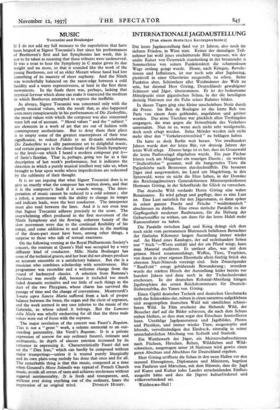MUSIC Toscanini and Boulanger
IF I do not add my full measure to the superlatives that have been heaped at Signor Toscanini's feet since his performances of Beethoven's first and last Symphonies last week, this is not to be taken as meaning that these tributes were undeserved. It was a treat to hear the Symphony in C major given its due weight and no more, so that it sounded like the work of the young Beethoven, not of an older Mozart whose hand had lost something of its mastery of sheer euphony. And the Ninth was wonderfully balanced on the razor-edge between a cold lucidity and a warm expressiveness, at least in the first three movements. In the finale there was, perhaps, lacking that mystical fervour which alone can make it transcend the medium in which Beethoven attempted to express the ineffable.
As always, Signor Toscanini was concerned only with the purely musical values, with the result that, as also happened even more conspicuously in his performances of The Zauberflote, the moral values with which the composer was also concerned were left out of account. " Moral values " and the " subject " are elements in a work of art that arc out of fashion with contemporary aestheticians. But to deny them their place is to empty some of the greatest masterpieces of their true significance, to reduce Fidelio to an ill-made melodrama, Die Zauberflote to a silly pantomime set to delightful music, and certain passages in the choral finale of the Ninth Symphony to the level—on which I heard a modern composer put it— of Satie's faceidae. That is, perhaps, going too far as a fair description of last week's performance, but it indicates the direction in which a purely musical intellect may take us, when brought to bear upon works whose imperfections are redeemed by the sublimity of their thought.
It is no use arguing that what Signor Toscanini does is to give us exactly what the composer has written down, and that it is the composer's fault if it sounds wrong. The inter- pretation of music cannot be reduced to a cold science ; else a robot, a metronome with the ability to change its tempo and indicate leads, were the best conductor. The interpreter must also read between the lines. And it is not even true that Signor Toscanini adheres precisely to the score. The overwhelming effect produced in the first movement of the Ninth Symphony and the flowing, coherent beauty of the slow movement were due to the continual flexibility of his tempi, and some additions to and alterations in the marking of the drum-part must have been, among other things, a surprise to those who talk of textual exactness.
On the following evening at the Royal Philharmonic Society's concert, the rostrum at Queen's Hall was occupied by a very different kind of conductor. Mlle. Nadia Boulanger has none of the technical graces, and her beat did not always produce an accurate ensemble or a satisfactory balance. But she is a musician who combines scholarship with sensitiveness. Her programme was recondite and a welcome change from the round of hackneyed classics. A selection from Rameau's Dardanus was mostly dull, because it included too much faded dramatic recitative and too little of such things as the duet of the two Phrygians, whose charm has survived the passage of time and the change of conventions.. Monteverdi's Sonata sopra Sancta Maria suffered from a lack of proper balance between the brass, the organ and the choir of sopranos, and the work seemed in any case inferior to the music of the Gabrielis, to whose school it belongs. But the Lamcnto della Ninfa was wholly enchanting for all that the three male voices were out of focus with the soprano.
The major revelation of the concert was Faure's Requiem. This is not a " great " work, a solemn memorial to an out- standing personality, like Verdi's Requiem. It is a private expression of sorrow for any ordinary funeral, intimate and undramatic, its depth of sincere emotion increased by its reticence in expressing it. Characteristically Faure did not set the " Dies Irae," which can hardly be composed without major trumpetings—unless it is treated purely liturgically and its own plain-song melody has done that once and for all. The remarkable thing is that this music, composed at a time when Gounod's Messe Solenelle was typical of French Church music, avoids all errors of taste and achieves tenderness without sugared sentimentality. It is fresh and transparent, and, without ever doing anything out of the ordinary, bears the
impression of an original mind. DYNELEY HUSSEY.














































 Previous page
Previous page